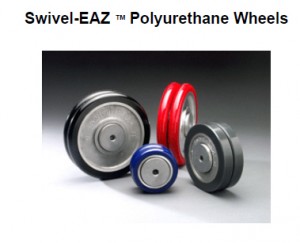One very important factor that is frequently overlooked when specifying casters for heavy duty industrial applications is the swivel lead of the caster.
The swivel lead of a caster is the offset distance between the vertical centerline of the casters raceway and the center of the axle hole on the leg. This dimension is key in determining how well the caster will operate. Increasing the swivel lead for heavy duty application provides a larger turning radius which reduces the force required to begin the caster to turn…which in turn:
- Improves Ergonomics and the Safety of employeesby decreasing the force to move and turn equipment.
- Gets rid of Caster Flutter for better tracking and payload protection.
- Eliminates annoyingly noisy Caster Chatter.
- Extends the Caster Life.
- Decreases Maintenance, Downtime and Workman’s Compensation costs.
While increasing the swivel lead of the caster will reduce the force needed to swivel the caster, it is important to determine the proper swivel lead to avoid negative outcomes. A combination of factors help to establish the optimal swivel lead, such as the size and total weight of the unit fully loaded along with other vital information such as space limitations.
Extending the swivel lead will does reduce the carrying capacity of the casters. It is very important to make sure to select a caster with a strong enough raceway to handle the load, such as a
Kingpinless style caster with a captured ball raceway for added strength.
Another important component is the section of any caster is the wheel. The wheel is the heart of the caster itself. In heavy duty industrial application we often turn to the
Swivel-EAZ® split tread polyurethane wheel for its reduced turning and rolling resistance. Here again, there are several factors that need to be considered when determining the wheel size, tread design (i.e. flat or crowned) and most important the harness of the wheel tread or the diameter.

California Caster specializes in
designing custom solutions to meet the most stringent application specific requirements. Our knowledgeable and experienced staff would be happy to help.
Terry Cavanaugh
 California Caster specializes in designing custom solutions to meet the most stringent application specific requirements. Our knowledgeable and experienced staff would be happy to help.
Terry Cavanaugh
California Caster specializes in designing custom solutions to meet the most stringent application specific requirements. Our knowledgeable and experienced staff would be happy to help.
Terry Cavanaugh